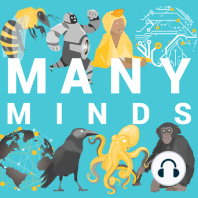68 min listen
Animal minds and animal morality
FromMany Minds
ratings:
Length:
94 minutes
Released:
Apr 27, 2022
Format:
Podcast episode
Description
Your friend is in a bit of distress. They’ve just been dunked in a pool, and they can’t pull themselves out. You’re looking on as they’re paddling furiously, trying to hold onto the pool’s ledge. Fortunately, there’s a way to save your friend, to give them an escape route. The thing is, there’s also something else vying for your attention at the moment: a chunk of chocolate. So what do you do? Do you first nab the chocolate and then free your friend? Turns out that most rats in this position—that’s right, rats—will first free their friend and then go for the chocolate. This is one of many studies that have raised profound questions about whether animals are moral beings, about whether they are capable of things like care and empathy. Such studies are doing more than raising questions about animal morality, though; they’re also reshaping our understanding of what animal minds are capable of. My guests today are not one but two philosophers: Dr. Kristin Andrews, Professor of Philosophy at York University in Toronto and Dr. Susana Monsó, Assistant Professor in the Department of Logic, History, and Philosophy of Science at UNED in Spain. Both Susana and Kristin have emerged as central figures in the new conversations and debates that springing about animal minds and animal morality. We cover a lot of ground in this episode. We talk about rats and empathy. We discuss the role of philosophy in the crossdisciplinary study of animal cognition. We talk about Kristin’s most recent book, which is a critical consideration of how scientists are trained to study animals, and Susana’s book, which is an extended investigation into animals’ understandings of death. We zoom in on the “animal morality debate”—about whether animals should be considered moral beings. We consider how touch might inform the debate and social norms and morality are deeply enmeshed than you may realize. As we navigate these lofty ideas, we also touch on the use of thermography to study emotions in marmosets, planning in orangutans, tongue-biting in orcas, and playing dead in possums. This is basically a double episode. It features two amazing guests. It takes on two big topics—the study of animal minds in general and the animal morality debate in particular. It’s also a tad longer than our usual fare, but I promised its packed with useful frameworks, provocative findings, and a bunch of open questions. I think it also picks up steam as we go—so be sure to stick with it, through to the second half. Alright folks, as always, thanks so much for listening. And be sure to send us your guest and topic ideas, your glowing reviews, and your crotchety comments. You can reach us on Twitter or by email at manymindspodcast@gmail.com. Now for my conversation with Dr. Susana Monsó and Dr. Kristin Andrews. Enjoy! A transcript of this episode is available here. Notes and links 5:00 – An essay by Dr. Andrews & Dr. Monsó in Aeon magazine, about how rats deserve ethical protections. 7:30 – A popular article about findings that vervet monkeys socially learn food preferences. The original research paper is here. 9:10 – A popular article on the findings that rats can learn to play hide-and-seek. 22:00 – Dr. Andrews’ most recent book is How to Study Animal Minds. Her earlier book, The Animal Mind, is now out in a second edition. 24:00 – Morgan’s Canon has been widely discussed and criticized in recent decades (see here, here, and here). 27:00 – A paper by Dr. Andrews on the role of folk psychology in animal cognition research. 33:00 – A paper by Dr. Andrews discussing the idea of “anthropectomy.” 34:00 – The paper by Dan Dennett that makes the distinction between “romantics” and “killjoys.” 35:20 – Dr. Monsó’s recent book (in Spanish) translates as Schrödinger’s Opossum. See also: her essay in Aeon about the phenomenon of “playing dead” and what it tells us about predator cognition; and her recent philosophical papers on the same topic (here, here). 49:30 – See the recent cha
Released:
Apr 27, 2022
Format:
Podcast episode
Titles in the series (100)
Message to the stars: A conversation with Daniel Oberhaus by Many Minds
